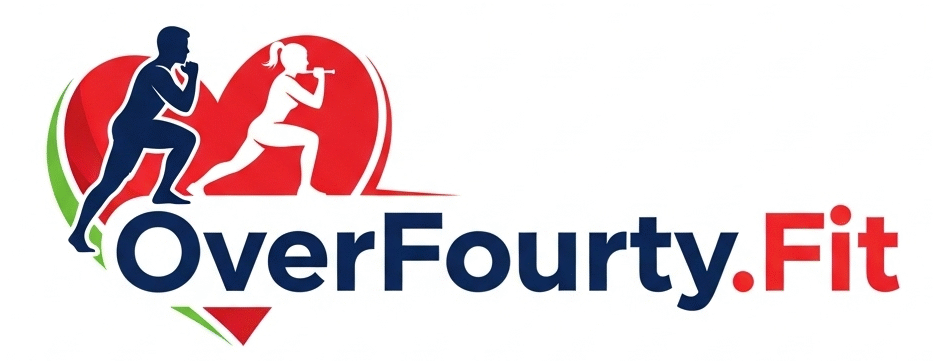Stress Management Techniques for Over 40: Stay Calm, Healthy & Happy
Hitting your 40s brings wisdom, experience, and often a busier life. Between career responsibilities, family demands, and health changes, stress can creep in fast.
Chronic stress doesn’t just affect your mood-it impacts heart health, weight, sleep, and even skin aging.
The good news? With the right stress management techniques for over 40, you can feel calmer, more focused, and healthier than ever.
Why Stress Hits Harder After 40
- Hormonal Changes – Perimenopause or andropause can influence mood and stress levels.
- Life Responsibilities – Balancing work, aging parents, and growing kids increases pressure.
- Slower Recovery – Your body takes longer to bounce back from stress.
If stress isn’t managed, it can also affect weight gain. Pairing these techniques with smart metabolism-boosting strategies in your 40s can make a huge difference in how your body feels and performs.

Top Stress Management Techniques for Over 40
1. Practice Deep Breathing Daily
Why: Activates the body’s relaxation response, lowering blood pressure and heart rate.
How: Inhale for 4 seconds, hold for 4, exhale for 6–8. Repeat for 5 minutes.
Best Time: Morning or before bed.
2. Exercise for Stress Relief
Why: Physical activity releases endorphins, which are natural mood boosters.
Best Options for Over 40: Walking, yoga, swimming, resistance training, and structured low-impact workouts for over 40 that are gentle on joints while still reducing stress effectively.
Combine this with a few sessions of strength training in your 40s to not only manage stress but also preserve muscle and metabolism.
3. Try Mindfulness Meditation
Why: Helps you stay present, reduces overthinking, and improves emotional regulation.
How: Use guided meditation apps or simply focus on your breath for 10 minutes.
Meditation pairs well with gentle yoga and stretching, which you can add to your flexibility routines after 40 for even deeper stress relief.
4. Reduce Caffeine & Alcohol
Why: Both can increase anxiety, disrupt sleep, and affect mood balance.
Tip: Swap your afternoon coffee for herbal tea like chamomile or peppermint.
5. Improve Your Sleep Routine
Why: Poor sleep raises cortisol levels and makes stress harder to manage.
How: Keep a consistent bedtime, avoid screens before bed, and create a cool, dark sleep environment.
For better results, align your bedtime routine with your healthy eating habits after 40 to promote steady energy and hormone balance.
6. Practice Gratitude Journaling
Why: Shifting focus to positives reduces stress and boosts happiness.
How: Each night, write down 3 things you’re grateful for.
7. Connect with Supportive People
Why: Social connections buffer against stress and improve mental health.
Tip: Schedule regular catch-ups with friends or join hobby groups.
This can be especially valuable when paired with active hobbies like partner yoga poses, which combine fitness and bonding.
8. Take Breaks from Technology
Why: Constant notifications keep your brain in “alert mode.”
How: Have at least one “tech-free” hour daily.

Quick Stress-Relief Tools You Can Use Anywhere
- Stretch your neck and shoulders for 2 minutes.
- Listen to calming music.
- Step outside for fresh air.
- Practice progressive muscle relaxation.
Sample Daily Stress-Relief Routine for Over 40
Morning:
- 5 minutes of deep breathing
- 10-minute walk outside
Afternoon:
- Short stretch break
- Herbal tea instead of coffee
Evening:
- Write in a gratitude journal
- 10 minutes guided meditation before bed
This pairs beautifully with low-impact cardio for over 40 to create a complete, stress-free lifestyle routine.
Long-Term Benefits of Managing Stress
- Lower blood pressure & heart disease risk
- Improved focus & productivity
- Better mood & emotional balance
- Slower signs of aging
Final Thoughts: Stress Management Techniques for Over 40
Stress in your 40s is inevitable, but it doesn’t have to control you. By practicing simple yet powerful stress management techniques daily, you can stay calmer, think more clearly, and protect both your physical and emotional health.
Consistency is the key. When you build stress relief into your routine, it not only improves your quality of life today but also strengthens your long-term well-being
FAQs About Stress Management Techniques for Over 40
How to manage stress at 40?
Managing stress at 40 starts with balancing lifestyle habits that support your mental and physical health. The best stress management techniques for over 40 include daily exercise (like walking or yoga), mindfulness meditation, getting 7–9 hours of sleep, eating a nutrient-rich diet, and maintaining social connections. Since stress tends to hit harder in your 40s due to hormonal changes and life responsibilities, making time for self-care routines is key.
What are the 5 C’s of stress management?
The 5 C’s of stress management are:
Calmness – Practice deep breathing and relaxation exercises.
Clarity – Stay mindful and present to reduce overthinking.
Control – Focus only on what you can influence instead of worrying about everything.
Competence – Build confidence by learning skills to manage challenges.
Community – Stay connected with supportive people to buffer against stress.
These principles help people over 40 adopt a structured approach to staying calm, focused, and emotionally balanced.
What is the 3 3 3 rule for stress management?
The 3-3-3 rule for stress management is a simple grounding technique to reduce anxiety quickly:
Look around and name 3 things you see.
Identify 3 sounds you hear.
Move 3 parts of your body (like fingers, shoulders, or feet).
This technique is especially helpful for managing stress at work or during overwhelming moments, making it a useful tool for anyone over 40.
What are 5 stress management techniques?
The top 5 stress management techniques for over 40 are:
Deep Breathing – Lowers blood pressure and heart rate.
Exercise – Walking, yoga, or low-impact workouts for over 40 help release endorphins.
Mindfulness Meditation – Keeps you grounded and reduces overthinking.
Healthy Sleep Routine – Ensures 7–9 hours of quality rest.
Gratitude Journaling – Shifts focus from stress to positivity.
Together, these techniques help reduce anxiety, improve emotional resilience, and support long-term health.







